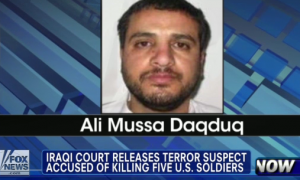Among the recent news about the war in Afghanistan is one making the talk show circuit about Afghanistan getting ready to release 65 high level terrorists. Earlier this year, the U. S. turned over control of the Detention Facility in Parwan (DFIP) to the Afghans. This was our primary holding center for captured combatants. I had a sorry sense of déjà vu upon hearing this. I was in Afghanistan in 2012 when I received news that the Iraqis were releasing Ali Musa Daqduq. Daqduq was one of the most dangerous and ruthless terrorist captured in Iraq. He was a senior Hezbollah commander responsible for countless U.S. deaths. In January of 2007, Daqduq was responsible for the kidnapping of five U. S. soldiers during a raid on the Karbla Joint Provincial Coordination Center. Those five U. S. soldiers were summarily executed by Daqduq and his gang. The recovered bodies showed signs of severe torture before execution.
I was in Iraq assisting the military in the prosecution of captured terrorists in 2011. During that time, the U.S. turned over all of Camp Cropper to the Iraqis. Camp Cropper at one time was the primary detention facility in Iraq. In keeping with the Status of Forces Agreement (SOFA), Camp Cropper, and its prisoners were turned over to the Iraqis in phases. By 2011, the U. S. only controlled a small portion of that prison that housed the most dangerous terrorists, Daqduq included. These were the baddest of the bad, and ones that the U.S. held on to until the last possible moment. The problem? We needed evidence to give to the Iraqis so the Iraqis could justify holding them and subsequently prosecuting them through their legal system.
Many of these bad guys had been captured on the battlefield years earlier. Soldiers and Marines were not concerned at that time with preserving “evidence” that would hold up in a civilian court at a later date. In addition, a lot of the evidence against these terrorists was classified and not releasable to a foreign nation.
Needless to say, the prisoners were turned over to the Iraqis with what little evidence we had. Most were subsequently released. Corruption, politics, and religious affiliations certainly played a starring role in Iraq and Afghanistan. Putting the politics of Iraq and Afghanistan aside, it is evidence that will hold up in a court of law that is necessary to obtain a conviction and a sentence. Merely saying that a person is “bad” without evidence to back it up will not hold in any legitimate court.
The same is true in the United States. Any law enforcement officer or agent can make an arrest. That is the easy part. It is the evidence gathered by that officer and the investigators that enables a conviction and withstands the scrutiny of a judge, jury, and a good defense attorney. Credible evidence, proper documentation, accurate report writing, and clear and truthful testimony are keys to obtaining a conviction. Sloppy or lazy investigative work, taking shortcuts, and questionable statements or testimony on behalf of the prosecution team will almost certainly lead to an acquittal. Same is true on the other side of the coin – sloppy or half-hearted work on the part of a defense team can lead to the conviction of an innocent party. We are extremely fortunate that in the United States, our rights as citizens to a fair trial is guaranteed by the first ten amendments to the U. S. Constitution, otherwise known as the “Bill of Rights”.

